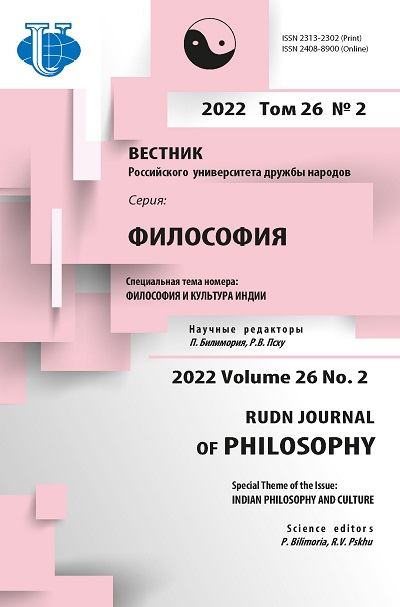Moral Sanctions: Two Traditions of Understanding
- Authors: Prokofyev A.V.1
-
Affiliations:
- Institute of Philosophy, Russian Academy of Sciences
- Issue: Vol 26, No 2 (2022): INDIAN PHILOSOPHY AND CULTURE
- Pages: 454-469
- Section: PRACTICAL PHILOSOPHY
- URL: https://journals.rudn.ru/philosophy/article/view/31377
- DOI: https://doi.org/10.22363/2313-2302-2022-26-2-454-469
Cite item
Full Text
Abstract
The paper is aimed at providing general outlines of the more than two-century history of the theory of moral sanctions. It rests on a thesis about unity of all disciplines studying morality. The aim of the paper has been achieved trough an analysis of how some basic concepts were borrowed and basic ideas were transformed. The first tradition links moral sanctions with public condemnation. Some of its adherents simply identified public condemnation with moral sanction. This opinion prevailed until the middle of the XXth century. Later it was suggested that a sanction becomes genuinely moral only when a transgressor herself is sensitive to condemnation because she recognizes that she deserves it and feels shame, guilt or remorse. It means that an external side of the sanction has to be complemented by an internal one. The first tradition presupposes a deep and thorough analysis of an external side of the moral sanction, i.e. various forms of sanctioning behavior (avoidance, censure, denunciation, reproach, scolding etc.) The second tradition was initiated by J.S. Mill and H. Sidgwick, it includes among moral sanctions the very negative emotions of self-appraisal. For adherents of this tradition, model and most important moral sanctions are internal: guilt and remorse. Characteristics of internal (autonomous) and external (heteronomous) sanctions were established in the XXth century anthropology. Later this distinction became current in the contemporary ethics.
Keywords
About the authors
Andrey V. Prokofyev
Institute of Philosophy, Russian Academy of Sciences
Author for correspondence.
Email: avprok2006@mail.ru
ORCID iD: 0000-0001-5015-8226
D.Sc. in Philosophy, associate professor, leading researcher, Department of Ethics
12/1 Goncharnaya Str., Moscow, 109240, Russian FederationReferences
- Hieronymi P. Fairness, sanction, and condemnation. In: Oxford studies in agency and responsibility. Vol. 8. Oxford: Oxford University Press; 2021. P. 229—258.
- Bentham I. Introduction to the principles of morals and legislation. Moscow: ROSSPEN publ.; 1998. (In Russ).
- Durkheim E. Sociology: Its subject, method, and purpose. Moscow: Kanon; 1995.
- Prokofyev AV. The Problem of Moral Sanctions in the Works of Emile Dukrheim. Journal of Siberian Federal University. Humanities & Social Sciences. 2022:15(11). [Pre-Print]. (In Russian).
- Parsons T, Shils E, Naegele K, Pitts J, editors. Theories of society: Foundations of modern sociological theory. Vol. 1. New York: Free Press;1961.
- Kelsen H. Pure theory of law. Saint-Petersburg: Alef-Press; 2015. (In Russian).
- Radcliffe-Brown AR. Structure and function in primitive society: Essays and addresses. Moscow: Vostochnaya literatura publ.; 2001. (In Russian).
- Hart HLA. The concept of law. Saint-Petersburg: Izd-vo S.-Peterb. Un-ta publ.; 2007. (In Russian).
- Parsons T. The structure of social action. New York: Free Press; 1966.
- Drobnitskii OG. The concept of morality: Historical-critical essay. Moscow: Nauka publ.; 1974. (In Russian).
- Wallace RJ. Responsibility and the moral sentiments. Cambridge: Harvard University Press; 1994.
- Apressyan RG. Ethics: Textbook. Mosсow: KNORUS publ.; 2017. (In Russian).
- Watson G. Agency and aswerability: Selected essays. Oxford: Clarendon Press; 2004.
- Scanlon T. Moral dimensions: permissibility, meaning, blame. Cambridge: Belknap Press; 2008.
- Shoemaker D. Attributability, answerability, and accountability: Toward a wider theory of moral responsibility. Ethics. 2011:121(3):602—632.
- Mill JS. Utilitarianism. Rostov-na-Donu: Donskoi izdatel’skii dom publ.; 2013. (In Russian).
- Sidgwick H. The methods of ethics. London: Palgrave Macmillan; 1962.
- Spencer H. The principles of ethics. The data of ethics. Moscow: LKI; 2008. (In Russian).
- Maitland FW. Mr. Herbert Spencer’s theory of society. Mind. 1883:8(31):354—371.
- Mead M. Cooperation and competition among primitive peoples. New York: McGraw-Hill Book Company; 1937.
- Piddocke, S. Social sanctions. Anthropologica. 1968:10(2):261—285.
- Benedict R. The Chrysanthemum and the sword: Patterns of Japanese culture. Moscow: ROSSPEN publ.; 2004. (In Russian).
- Gibbard A. Wise choices, apt feelings: A theory of normative judgment. New York: Harvard University Press; 1990.
- Crisp R. Reasons and the good. New York: Oxford University Press; 2006.
- Greenspan P. Practical guilt: moral dilemmas, emotions, and social norms. Oxford: Oxford University Press; 1995.
- Wellman C. Real Rights. New York: Oxford University Press; 1995.
















